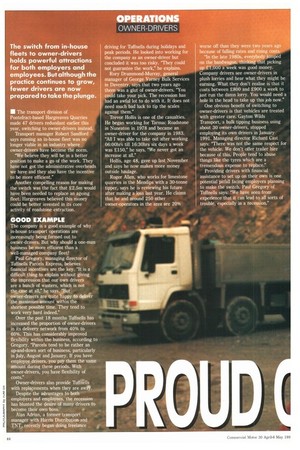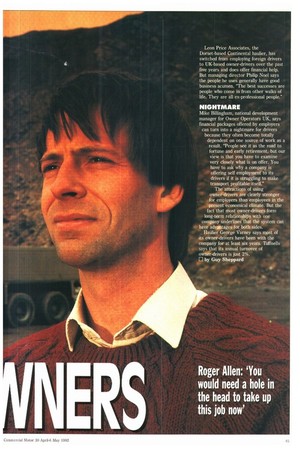PERATI • N
Page 46

Page 47

If you've noticed an error in this article please click here to report it so we can fix it.
OWNER-DRIVERS
: The switch from in-house fleets to owner-drivers holds powerful attractions for both employers and employees. But although the practice continues to grow, fewer drivers are now prepared to take the plunge.
• The transport division of Pontefract-based Hargreaves Quarries made 47 drivers redundant earlier this year, switching to owner-drivers inste Transport manager Robert Sandford says running an in-house fleet was no longer viable in an industry where owner-drivers have become the norm.
"We believe they will be in a better position to make a go of the work. They have not got the administrative overheads we have and they also have the incentive to be more efficient."
Another compelling reason for making the switch was the fact that £2.5m would have been needed to replace an ageing fleet. Hargreaves believed this money could be better invested in its core activity of roadstone extraction.
GOOD EXAMPLE
The company is a good example of why in-house transport operations are increasingly being farmed out to owner-drivers. But why should a one-man business be more efficient than a well-managed company fleet?
Paul Gregory, managing director of Tuffnells Parcels Express, believes financial incentives are the key. "It is a difficult thing to explain without giving the impression that our own drivers are a bunch of wasters, which is not the case at all," he says. But owner-drivers are quite 'happy to dollivrr the maximum amount within the shortest possible time. They tend to work very hard indeed."
Over the past 18 months Tuffnells has increased the proportion of owner-drivers in its delivery network from 40% to 60%. This has considerably improved flexibility within the business, according to Gregory. "Parcels tend to be rather an up-and-down sort of business, particularly in July, August and January. If you have employee drivers, you pay them the same amount during these periods. With owner-drivers, you have flexibility of costs."
Owner-drivers also provide Tuffnells with replacements when they are awn'.
Despite the advantages to both employers and employees, the recession has blunted the desire of many drivers to become their own boss.
Alan Adrian, a former transport manager with Harris Distribution and TNT, recently began doing freelance driving for Tuffnells during holidays and peak periods. He looked into working for the company as an owner-driver but concluded it was too risky. "They could not guarantee the work," he explains.
Rory Drummond-Murray, general manager of George Varney Bulk Services in Daventry, says that two years ago there was a glut of owner-drivers. "You could take your pick. The recession has had an awful lot to do with it. It does not need much bad luck to tip the scales against them."
Trevor Hollis is one of the casualties. He began working for Tarmac Roadstone in Nuneaton in 1978 and became an owner-driver for the company in 1983. "All I was able to take out after working 06:00hrs till 16:30hrs six days a week was £150," he says. "We never got an increase at all."
Hollis, age 48, gave up last November and says he now makes more money outside haulage.
Roger Allen, who works for limestone quarries in the Mendips with a 30-tonne tipper, says he is reviewing his future after making a loss last year. He claims that he and around 250 other owner-operators in the area are 20% worse off than they were two years ago because of falling rates and rising
"In the late 1Ws, evle jumped
on the bandw4W thin at picking up £1,000 a week was good money. Company drivers see owner-drivers in plush lorries and hear what they might be earning. What they don't realise is that it costs between £800 and £900 a week to just run the damn lorry. You would need a hole in the head to take up this job now."
One obvious benefit of switching to owner-drivers is that vehicles are treated with greater care. Gayton Wilds Transport, a bulk tipping business using about 30 owner-drivers, stopped employing its own drivers in January 1991. Managing director Richard Cast says: "There was not the same respect for the vehicle. We don't offer trailer hire because of this. People tend to abuse things like the tyres which are a tremendous expense to replace."
Providing drivers with financial assistance to set up on their own is one potential pitfall facing employers planning to make the switch. Paul Gregory of Tuffnells says: "We have seen from experience that it can lead to all sorts of trouble, especially in a recession." Leon Price Associates, the Dorset-based Continental haulier, has switched from employing foreign drivers to UK-based owner-drivers over the past five years and does offer financial help. But managing director Philip Noel says the people he uses generally have good business acumen. The best successes are people who come in from other walks of life. They are all ex-professional people."
NIGHTMARE
Mike Billingham, national development manager for Owner Operators UK, says financial packages offered by employers can turn into a nightmare for drivers because they often become totally dependent on one source of work as a result. "People see it as the road to fortune and early retirement, but our view is that you have to examine very closely what is on offer. You have to ask why a company is offering self employment to its drivers if it is struggling to make transport profitable itself."
The attractions of using owner-drivers are clearly stronger for employers than employees in the present economical climate. But the fact that most owner-drivers form long-term relationships with one company underlines that the system can have advastages for both sides.
Haulier George Varney says most of its owner-drivers have been with the company for at least six years. Tuffnells says that its annual turnover of owri&-drivers is just 2%.
LI by Guy Sheppard
















































































































